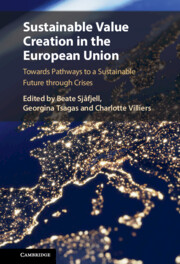 Sustainable Value Creation in the European Union
Sustainable Value Creation in the European Union Book contents
- Sustainable Value Creation in the European Union
- Sustainable Value Creation in the European Union
- Copyright page
- Dedication
- Epigraph
- Contents
- Figures
- Tables
- Contributors
- Foreword
- Preface
- Part I The Objectives of the EU’s Social Market Economy Revisited
- Part II The (UN)Sustainability of the EU Economic System
- 4 Fiscal Austerity and Monetary Largesse
- 5 Sustainability and Eurozone 2.0
- 6 The Economic Adjustment Programmes of Greece (2010–2018): Why Failure?
- 7 Shareholder Activism
- Part III Ways Forward in the Promotion of Value Creation
- Part IV Thinking Ahead
- Index
5 - Sustainability and Eurozone 2.0
Still Impossible?
from Part II - The (UN)Sustainability of the EU Economic System
Published online by Cambridge University Press: 01 December 2022
- Sustainable Value Creation in the European Union
- Sustainable Value Creation in the European Union
- Copyright page
- Dedication
- Epigraph
- Contents
- Figures
- Tables
- Contributors
- Foreword
- Preface
- Part I The Objectives of the EU’s Social Market Economy Revisited
- Part II The (UN)Sustainability of the EU Economic System
- 4 Fiscal Austerity and Monetary Largesse
- 5 Sustainability and Eurozone 2.0
- 6 The Economic Adjustment Programmes of Greece (2010–2018): Why Failure?
- 7 Shareholder Activism
- Part III Ways Forward in the Promotion of Value Creation
- Part IV Thinking Ahead
- Index
Summary
The late 2000s Eurozone crisis has constituted the cause for an extensive overhaul of the EU’s, and primarily the Eurozone’s, modus operandi. The modifications introduced include reinforced budgetary discipline and enhanced fiscal surveillance framework, but also substantial delegation of decision-making authority from the national to the supranational level. The changes are so extensive that this could be described as a fourth stage of economic and monetary union, or a Eurozone 2.0. The aim of the adopted measures has been argued to be a more economically sustainable development. This chapter analyses whether this has been the case. Have these measures created a more sustainable economic environment? Of particular interest is the criticism that the Eurozone suffers from severe socio-economic and cultural imbalances that render the entire project unsustainable. It is found that the changes introduced into the EU framework during the crisis have attempted to create a more cohesive and integrated Eurozone/EU, both economically and politically, but that it is highly doubtful whether such changes promote an efficient and sustainable model of economic governance.
Keywords
- Type
- Chapter
- Information
- Sustainable Value Creation in the European UnionTowards Pathways to a Sustainable Future through Crises, pp. 113 - 130Publisher: Cambridge University PressPrint publication year: 2022


